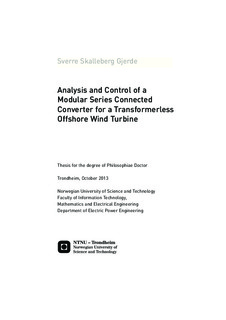| dc.contributor.author | Gjerde, Sverre Skalleberg | nb_NO |
| dc.date.accessioned | 2014-12-19T13:54:40Z | |
| dc.date.available | 2014-12-19T13:54:40Z | |
| dc.date.created | 2013-11-25 | nb_NO |
| dc.date.issued | 2013 | nb_NO |
| dc.identifier | 667119 | nb_NO |
| dc.identifier.isbn | 978-82-471-4688-0 (printed ver.) | nb_NO |
| dc.identifier.isbn | 978-82-471-4689-7 (electronic ver.) | nb_NO |
| dc.identifier.uri | http://hdl.handle.net/11250/257706 | |
| dc.description.abstract | A modular series connected converter consisting of N number of converter units, suitable for a high power, high voltage transformerless offshore wind turbine is analyzed in this thesis. The main objective is to verify the feasibility of the proposed converter system as a suitable interface between a modular axial flux ironless stator permanent magnet synchronous generator and a high voltage DC link.
The physical properties of the modular generator and the series connected converter are analyzed. A relation between variations in physical parameters of the generator/converter modules and deviating DC-bus voltages in the modules is identified, and described analytically. The series connection requires balanced voltages between the DC-buses of the modules in order to achieve the best total operation of the converter units, and stress them equally. Additionally, the high voltage insulation of the generator requires balanced module voltages for optimal insulation design. As a consequence, a DC-bus voltage control is introduced to mitigate the identified DC-bus voltage deviations. This control may result in a need to derate the turbine due to increased current loading of some modules. The derating depends on the combination of control strategy and module-parameter variations. The need for a DC-bus voltage controller is further supported by the small-signal-stability analysis of the modular converter system operated in current-control mode. This analysis demonstrates that the internal voltage distribution of the DC buses is only stable in the generator mode, and instable in the motor mode.
Based on the theoretical analysis, the synthesis of a modular control system is presented. The synthesis is built on a generator mathematical model which decouples the control of each stator segment and converter unit from the other modules. Hence, a 3-phase vector current control can be applied to each converter unit control. Given the need for compensating different bus voltages, a DC-bus voltage PI controller is added in each module. It is demonstrated that the control system can be designed to be sufficiently robust to function satisfactorily in all operating conditions.
The DC-bus voltage control reference is generated in the main turbine control unit. A torque-based DC-voltage droop is proposed to remove steady-state net turbine torque contributions from the DC-bus voltage balance control in normal operation. The cause of this problem is an overdetermined DC-voltage control system, with one degree of freedom less that the number of PI controllers. Frequency response analysis of the droop control is presented for the selection of control parameters. The inclusion of the droop is necessary to provide a fully modular control system.
The main turbine control also provides turbine power control, and its interface to the module controllers is the torque reference and DC-bus voltage reference.
The system fault tolerance with respect to converter unit failures is analyzed. Two scenarios are identified that are of special interest for the modular, series connected converter: The first is the response to a converter unit trip. For safeoperation of the converter chain, a redundant (N − 1) component voltage rating is required due to the overvoltages in the functioning modules caused by the converter trip. It is demonstrated that continued operation is possible, either by reconnecting the tripped module (in case of false trip) or bypassing the module. In the latter case, the modular converter continues operating with N − 1 units, with the full DC-link voltage. The second fault scenario is the response to the overloading of a single module. An operation strategy for deloading single modules with minimum turbine power reduction is developed and the limits of this control mode are identified.
The concept of the modular, series connected converter is verified experimentally using a laboratory setup based on a 45 kW 270 V prototype of the special generator. The machine consists of three stator segments connected to three converter units. The experimental results are used to verify the feasibility of the control of the converter chain with a modular control approach. Additionally, the DCdroop control functionality is demonstrated. Finally, the fault-tolerant operation and control modes are verified. | nb_NO |
| dc.language | eng | nb_NO |
| dc.publisher | Norges teknisk-naturvitenskapelige universitet, Fakultet for informasjonsteknologi, matematikk og elektroteknikk, Institutt for elkraftteknikk | nb_NO |
| dc.relation.ispartofseries | Doktoravhandlinger ved NTNU, 1503-8181; 2013:279 | nb_NO |
| dc.title | Analysis and Control of a Modular Series ConnectedConverter for a Transformerless Offshore Wind Turbine | nb_NO |
| dc.type | Doctoral thesis | nb_NO |
| dc.contributor.department | Norges teknisk-naturvitenskapelige universitet, Fakultet for informasjonsteknologi, matematikk og elektroteknikk, Institutt for elkraftteknikk | nb_NO |
| dc.description.degree | PhD i elkraftteknikk | nb_NO |
| dc.description.degree | PhD in Electric Power Engineering | en_GB |
